Renaissance Man
By Deneb Sumbul | Profile | Published 7 years ago
Under a new director, the T2F is born again.
By Deneb Sumbul
Since Arieb Azhar became the new director of T2F last year, activities at Karachi’s favourite community space and watering hole for open dialogue, have picked up considerably. When he first shifted to Karachi, Arieb was overwhelmed by the visibly deep connection and diverse relationship Karachi’s eclectic residents had with the T2F. “I know many musicians, actors, comedians, activists and journalists who started their journey by being part of a T2F activity. That random one-off engagement triggered something in them. And while there are several people who were so deeply shaken by the terrible assassination of T2F founder and mentor, Sabeen Mahmood, that they have been unable to return to it, this is still a place that inspires many,” says Arieb.
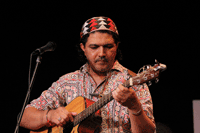
Without straying from Sabeen’s vision of making the T2F a safe haven for open discourse and dialogue, Arieb has added his own style and sensibility to the new-age tea-house. This in turn has widened the scope of its activities. For example, being a musician himself, it is perhaps just natural that the T2F is now holding more music events. Those, in addition to panel discussions on assorted topics and workshops on varied subjects that include public speaking, self-defence, art, etc. Also, there are book launches, comedy nights, philosophy circles, film screenings, ‘World Days’ for issues like AIDS, and many other events.
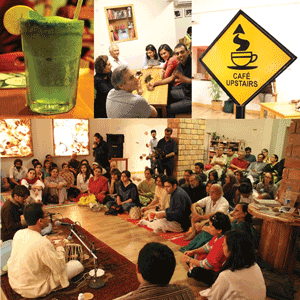 If that weren’t enough to engage him, since his donning the T2F mantle, Arieb is often invited to other forums to speak on culture, music and Sufi poetry. In the last couple of months alone, he has been a panelist on a discussion on a ‘Better Future with Community Spaces,’ at the ‘A World of Tomorrow Reimagined – School of Tomorrow’ events held in Karachi; he has travelled to Islamkot, Tharparkar for a TedX talk; performed at the Karachi Arts Council’s Human Rights Day and at the Ayaz Melo in Hyderabad, and was a judge at the Lyari session of the third IAMKARACHI Music Mentorship Programme.
If that weren’t enough to engage him, since his donning the T2F mantle, Arieb is often invited to other forums to speak on culture, music and Sufi poetry. In the last couple of months alone, he has been a panelist on a discussion on a ‘Better Future with Community Spaces,’ at the ‘A World of Tomorrow Reimagined – School of Tomorrow’ events held in Karachi; he has travelled to Islamkot, Tharparkar for a TedX talk; performed at the Karachi Arts Council’s Human Rights Day and at the Ayaz Melo in Hyderabad, and was a judge at the Lyari session of the third IAMKARACHI Music Mentorship Programme.
That the seemingly indefatigable Arieb handles his frenetic schedule, relating to so many things cerebral, with such effortless ease is not hard to understand: activism was almost certainly part of the genetic makeup of the son of Aslam Azhar, the much-loved PTV founder, and Nasreen Azhar, a women’s activist and member of the Women’s Action Forum. Growing up during the Socialist movement of the 1980s, during his teenage years, when his father was removed from PTV by Zia-Ul-Haq’s military government and his family was living in Karachi, Arieb was an active participant.
His parents had been introduced to the vibrant leftist movement in the ’80s in Karachi, and Arieb’s father, along with Mansoor Saeed (father of actor and activist, Sania Saeed), formed the Dastak theatre group. Resultantly, their house became a hub of cultural, intellectual and political activities. Arieb played street songs and became part of the children’s left-leaning activist organisation in Sindh called Sathi Bar Sangat, going on to become the president of the Karachi chapter. He later joined the Democratic Students Federation.
Comparing the present political atmosphere with that of the 1980s, Arieb feels that despite the heightened state of repression during Zia-ul-Haq’s regime, Pakistani society in general was more open-minded and liberal than it is today. Even then there was space in society for open discourse and new ideas. In 1988-1989 his family shifted back to Islamabad when his father was recalled to PTV by the Benazir Bhutto government.
To a young communist activist, the Soviet Union was akin to the Promised Land, and it was to this land he departed at the age of 17 for higher studies. Several of his older friends discouraged him from going, saying he was viewing the USSR through rose-tinted glasses, but believing wholeheartedly in the romance of revolution, Arieb went ahead determinedly – only to return after four months. He says, “When I got there, what I had so fervently believed was Western propaganda against the Soviet Union, turned out to be true. There was no doubt that the Soviet Union had made numerous advances; and they had turned their agrarian/rural nation into one of the most industrialised countries in the world, as well as into one of the world’s superpowers – but all at the cost of personal liberty and true democracy. The new oppressors of the people were the Communist Party themselves, which was a big shock for me – and that’s when cracks in my ideology first developed.”
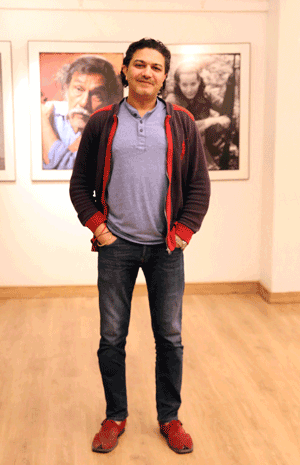
On his return to Islamabad, Arieb started a theatre group at the Quaid-e-Azam University. During this time, he and his family became close to a filmmaking couple from Croatian television visiting from Zagreb. They were making a documentary series on Pakistan over a two-year period and Arieb travelled with them around the country as their interpreter. In the course of their travels, they suggested that instead of applying to American Universities, Arieb should consider studying in Yugoslavia. The reasons were compelling, they said. Yugoslavia was not just part of Central Europe, it was open-minded, peaceful, and a non-aligned country – it was neither with the Soviet Union, nor with the USA. Yet it had the best of both worlds – socialism and capitalism. Arieb considered this option, and soon thereafter left to pursue higher studies in Croatia, then one of the republics of Yugoslavia.
Arieb had been there barely 8 to 10 months when the civil war erupted, which led to the break-up of Yugoslavia. He recalls, “No one saw it coming and the terrible ethnic violence was shocking for all my Croatian friends. Yes, there were problems, beginning with Milošević being the president of Serbia, there were disagreements within their central parliament, but the people believed that as Europeans, they had come a long way since WWII. They didn’t want a repetition of events. But overnight matters went from bad to worse and people just went crazy,” he recalls.
Nonetheless Arieb remained in Croatia for 13 years, staying through the civil war, and saw first-hand the violent break-up of a country, witnessed the reconstruction in Croatia, and the extreme right-wing, intolerant nationalist government that came to power which was completely opposed to the old idea of Yugoslavia. Being in Croatia, Arieb was caught up in the turmoil and in the process, was also attacked by Serbs, which, at the time, turned him against them on a personal level. But later, after reading history he says, he discovered that the reality on the ground was not as black and white as he had been led to believe. He felt the break-up of the federated country could have been non-violent, like the peaceful dissolution of the Czech Republic and Slovakia.
All the while Arieb continued with his academic pursuits, studying Philosophy in the local language. Alongside he started playing music professionally and learnt about Croatian music. “I played with different music groups and bands, and performed on the streets, in pubs and bars. Then I formed an Irish band when I met up with a few Irish musicians and was initiated into their culture and music. As The Shamrock Rovers, Arieb’s music group became popular in Zagreb and Croatia with a sizeable fan following.
In 2010, Arieb produced a 13-episode music travel documentary series for Aag TV – Geo’s music channel – called Salaam Balkan. Hosted by Arieb, this was a music diary that explored and celebrated the beautiful lands, culture and music of the Balkans – namely, Bosnia and Croatia.
Despite making money, Arieb discloses, he did not save any, but maintains, “It was great fun being with the band for about seven years – the most beautiful period of my life.” However, he adds, “I felt that as an artist I had stopped growing. I needed more maturity in my music and my art needed some direction. I wanted to reconnect with the folk music I had grown up listening to in Pakistan, like Pathanay Khan, Tufail Niazi, Alam Lohar, Reshma Ji and Shaukat Ali. These were the great folk singers I was accustomed to seeing at our house because of my father’s association with PTV where he would promote them.
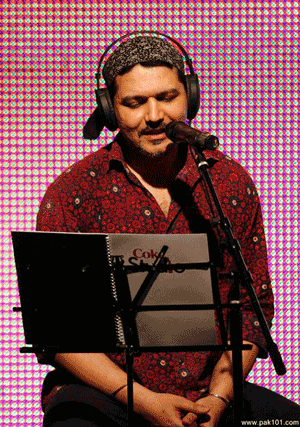
“Their music had always struck a chord in my heart but I never really understood what they were singing about because it was in pure Punjabi, Seraiki or Sindhi. By this time, already having lost some of the ideologies I had espoused at different times in my life, I was seeking new interpretations of the truth. I wanted to delve deeper into the music sung by our folk singers. I also wanted to spend more time with my parents because they were getting on with life and with my younger sister. This was the motivation that brought me back to Pakistan.”
He continues, “There was a time in my life I studied different religions, but that was more as very central works of literature than matters of faith. I started reading what people call mysticism. There was a period in Croatia I would sit with anyone who claimed to have some kind of esoteric knowledge, be it a yoga group or a Hari Krishna group or a Buddhist meditation group. I also met some very interesting groups who used psycho-analysis as a basis and did some very interesting experiments that I was a part of.
“I eventually started reading Sufism and discovered the same things were being said in its beautiful poetry that I was listening to while growing up, but without understanding. After returning to Islamabad, I became more exposed to our Punjabi Sufi poetry which I found fascinating and refreshing and then started composing it and working with it.”
In 2013, Arieb featured as one of the six characters in a documentary titled Without Shepherds. The American-Pakistani co-production basically tells the story of Pakistan and celebrates the bravery of these individuals from different walks of life. They include Imran Khan, the cricket star who starts a political party, a female journalist who goes behind Taliban lines, a Taliban school teacher seeking redemption for the violence he was part of with this group, a Quetta truck driver who crosses dangerous territory to feed his family, supermodel Vaneeza who pushes feminism through fashion and Arieb as the subversive Sufi rocker who uses music to heal. Filmed over a two year period, Arieb is also the narrator of the film. The film received critical acclaim and won several international awards, one for the best film at the Brooklyn Film Festival.
Arieb also started a festival called Music Mela after receiving a grant from the Pak-US Alumni Network and joining forces with FACE (Foundation for Arts, Culture and Education) for it. The festival was held for three years. During this time, the idea for the ‘Indus Blues’ documentary germinated when Arieb’s friend Jawad Sharif, a director, approached him about making a film on the dying musical instruments of Pakistan.
Two years ago the pair got a chance to work on it. Being a musician and having musician-friends from all genres, including folk and classical, Arieb was already familiar with the subject. After some research on endangered musical instruments he made a project proposal and through FACE, pitched the idea to the US Ambassador’s Fund. Upon receiving the grant for the documentary, Arieb engaged Jawad Sharif to direct it.
As the creative producer for Indus Blues, Arieb travelled non-stop from the north to the south of Pakistan with Jawad, and had his team interview musicians for three to four months in all the five provinces, in the process getting some great footage. The documentary was released recently and is currently doing the rounds of the international festival circuit, garnering publicity and awards. It will be screened at the T2F and promoted in Pakistan next year, after it has done the rounds of international festivals.
And with this mindset, the new T2F director says he would like to see it moving in the direction of a think tank. In other words, he says, several of the activities that take place at the T2F need to be recorded, documented, sorted and made readily available to people, including those in the government. He adds he would like people working towards change, even those in the government, say, in education or energy or in the arts and culture, or those seeking to eradicate extremism, come to T2F to explore ideas, suggestions and meet with other like-minded folk.
Arieb plans to establish festivals as platforms to promote music and culture through a multi-disciplinary approach. Battle of the Bands and other similar music programmes on television, he feels are not going to change the lives of musicians, unless they are provided regular opportunities to perform. He considers festivals – not just a stage and audience – the best way for people to gather around an idea.
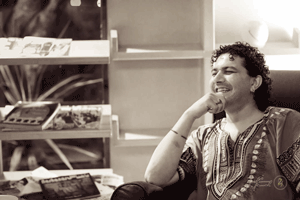
Arieb’s latest baby is ‘The Art Langar,’ a mela he wants to set up in Karachi. He discloses his original purpose for moving to Karachi. The first Art Langar festival took place in Islamabad in December 2017 and Arieb is hopeful that towards the end of February an Art Langar will take place in Karachi. After that he plans to take it to Lahore and Islamabad and then to the smaller cities of Pakistan, and after that, abroad. Another major task in the pipeline for Arieb is his plan to hold a ‘Creative Karachi Festival’ at T2F in the coming year.
Pretty much a citizen of the world, Arieb is currently loving “Karachi’s crazy tempo.” He thinks this is the perfect platform for him to put into motion all the ideas germinating in his mind.
The writer is working with the Newsline as Assistant Editor, she is a documentary filmmaker and activist.


